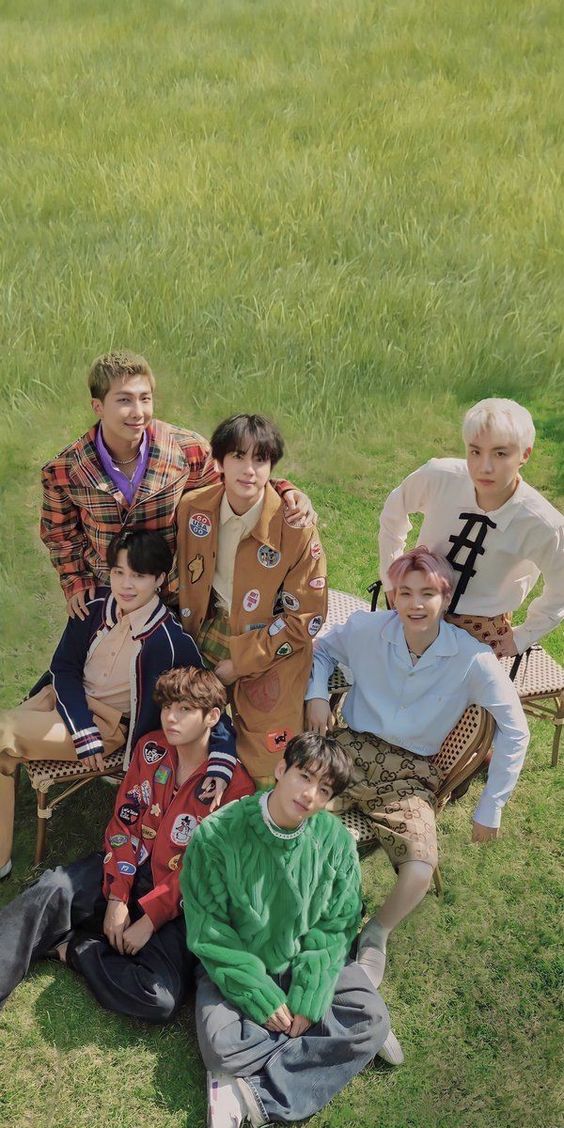The name “Bangtan Sonyeondan,” which is abbreviated as “BTS,” translates to “Bulletproof Boy Scouts.”
Fans were taken aback by how cheesy the group’s name sounded when it was first released. The name evoked images of Cub Scouts. It was a source of amusement for fans. Fans who speak English are relieved that the group chose BTS as their English-language tag. As this allows them to maintain their dignity.
Since its debut in June 2013, BTS, an acronym for Bangtan Sonyeondan or “Beyond the Scene,” has won the hearts of millions of fans around the world. The group has been nominated for a Grammy.

Additionally, RM, Jin, SUGA, j-hope, Jimin, V, and Jung Kook are the BTS members. BTS has established itself as the “Pop Icons of the 21st Century”. By breaking countless world records for its authentic and self-produced music. Also with outstanding performances, and the way they interact with their fans. While imparting a positive influence through initiatives such as the LOVE MYSELF campaign and the UN ‘Speak Yourself’ speech. The band has mobilized millions of fans across the globe (named ARMY) and collected four No. 1 songs within nine months. Performed multiple sold-out stadium shows across the globe, and been named TIME’s Entertainer of the Year 2020.
BTS is nominated for Best Pop Duo/Group Performance at the 63rd Grammy Awards. And has been honored with numerous prestigious awards. Including the Billboard Music Awards, American Music Awards, and MTV Video Music Awards.
What is K-pop?
K-pop is the abbreviation for Korean pop music. It is most commonly referred to as K-pop, which is South Korean mainstream music.
Also, K-pop music in the country is comparable to Taylor Swift’s music in the United States.
You may encounter K-pop, K-pop, K-pop, K-pop, K-Pop, and KPOP.
How South Korea’s Pop Music Became a Worldwide Phenomenon
The concept that South Korean pop culture has grown in prominence to become a major driver of global culture is referred to as “Hallyu,” or the Korean wave. This concept can be seen in everything from Korean dramas on Netflix to Korean skincare regimens. That is dominating the cosmetics industry to delicious Korean tacos on your favorite local restaurant’s menu. And at the very center of the Hallyu wave is the ever-increasing popularity of K-pop. Which is, of course, an abbreviation for Korean pop music.
Moreover, K-pop has become a truly global phenomenon thanks to its distinctive blend of addicting melodies. Slick choreography and production values. Also an endless parade of attractive South Korean performers who spend years in arduous studio systems learning to sing and dance in synchronized perfection.

Members
The average size of a boy band in the United States is five members, but in South Korea, some groups have as many as ten members, making the American standard of seven members seem positively modest. Rap Monster, Suga, and J-Hope are the members of BTS who rap, while Jin, Jimin, V, and Jungkook are the members of the group who sing. Two members of the septet, Jimin and Jungkook, are the only ones who do not go by their stage names.
The majority of their music is created by them.
Each of the seven members of BTS has its fair share of writing credits scattered throughout the group’s discography. Rappers Suga and Rap Monster in particular have gained recognition as producers. To develop their one-of-a-kind hip-hop-influenced dance style. The band collaborated with Korean producers Pdogg and Slow Rabbit on the composition of the vast majority of their songs.
K-pop got its start on April 11, 1992. When a hip-hop trio by the name of Seo Taiji and Boys performed in a talent show on a national South Korean network. BTS is the product of an industry insider who wanted to create a new kind of idol. It was unheard of for a culture whose musical production had been subjected to stringent government oversight. This is during the preceding few decades to have innovators such as Seo Taiji and Boys challenge norms. Regarding musical styles, song topics, fashion, and censorship. This was the case in South Korea, where the government had been closely monitoring musical production. But that wouldn’t be permanent.
Kpop Music
The decade of the 1990s saw the beginning of the development of what would later be referred to as idol groups at three major music studios. Idol groups are polished to perfection. With the intention of presenting the very highest standards of beauty, dance, and musicality. Idol groups are assembled through auditions and years of grooming within an intense studio culture. Which is the highly regimented system of idol group production in Korean and Japanese music studios. When they are young, the children who enter these studios spend the majority of their lives enduring strenuous training in order to become members of an idol group. If they are picked, the recording studio will have a great deal of influence not only over the music they perform and how their band is promoted but also over their day-to-day activities and the songs that they choose to sing.
They Prefer Trilogies.
BTS’ Korean discography has primarily been comprised of two EP trilogies, with the exception of their full-length albums Dark & Wild (2014) and Wings (which was released this month). (The band has also put out two albums in the Japanese language.) The release of their first album, “2Cool 4Skool,” followed by “O!RUL,2?” (2013) and “Skool Luv Affair” (2014) marked the beginning of their career and was accompanied by the “Skool trilogy.” The aggressive songs in the trilogy were connected to the struggles that students faced in their daily lives. Songs from the 2015–2016 trilogy The Most Beautiful Moment in Life (Part 1, 2, and Epilogue albums) featured more experimental sounds and more nuanced meanings, drawing inspiration from the experiences of young adults.
Rap Monster & Suga Aren’t Just K-pop Singers
K-pop is characterized as a manufactured pop genre created by corporations with performers who have little control over their music. This has changed over the past few years as more Korean artists demonstrate their production skills, and BTS has made it abundantly clear that they are not playing around. Rappers Rap Monster and Suga have each released intensely personal mixtapes, demonstrating that the group is not a typical pop boy band. Agust D, a mixtape released by Suga earlier this year, addressed depression, providing the antithesis to the industry’s idol-like conceptions of performers.